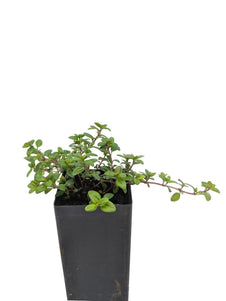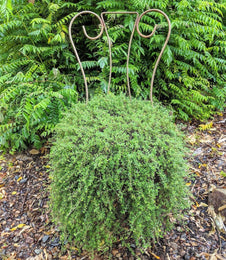











Thyme - Cretan Thyme
Thyme - Cretan Thyme

- Low stock - 7 items left
- Inventory on the way

Usually available: All year
Life cycle: Perennial
Height: 3 - 8cm
Position: Full sun
Soil preference: Well drained
This is how we pack and send your Herb Plants to all states except TAS & WA
You will receive
- 1 Thyme - Cretan Thyme Herb Plant in a 50 X 75mm tube - General growing instructions
All of our Herb Plants are grown organically with certified organic potting mixes and fertilizers
Botanical Name: Thymus longicaulis subsp. chaubardii
This variety of thyme is a perennial native to Crete and the Mediterranean. This hardy creeper and ground cover will gorw well in an area that gets light foot traffic. Grow it between pavers for a fragrant walkway in sunny parts of your garden. In spring and summer, when it flowers it has the appearance of a pink carpet. The leaves are a green and are held on stems up to 10 cm long.
Thyme, generally, has appeared in writings over 3000 years old and the origin of the name is thought to be the Greek words ‘thumus’ for courage, or thymos, meaning ‘to perfume’. Cretan thyme is a great bee attractant aplant..
Growing Conditions
A ground hugging plant, which grows to 5cm and spreads up to 50 cm. This plant loves the sun and can be planted in dry, exposed locations, including loose, sandy soil. It needs little water and will die in heavy, damp soil. Propagation may be by seed, cuttings or dividing the roots. It will also grow well in containers if provided with a well drained soil mix.
Medicinal Uses
The active ingredient in thyme is thymol, which is a powerful antiseptic used in antiseptics and mouthwashes. Cretan thyme has similar medicinal properties to common thyme.
Culinary Uses
Cretan thyme has a less distinctive taste that the common thyme, but is more flavoursome than most of the other creeping varieties. Thyme helps to digest fatty foods and can be used with many meat and poultry dishes, egg and salad dishes.
Companion Plants
Cabbage, eggplant, salad burnet and strawberries all benefit from having thyme in the garden. Thyme attracts bees and other beneficial predator insects. Thyme is also thought to repel cabbage worms and flea beetles.
All information provided on this website is for informational purposes only. Please seek professional advice before commencing any treatment.






